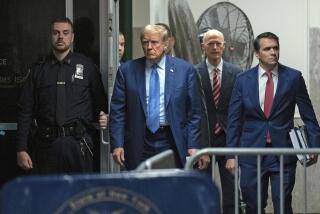Conviction of Tech Banker Is Reversed
- Share via
NEW YORK — A federal appeals court threw out the criminal conviction of Silicon Valley financier Frank Quattrone on Monday, ruling that the judge gave faulty jury instructions at Quattrone’s 2004 obstruction-of-justice trial.
The three-judge panel sent the case back to district court for retrial but, in a rare step, removed U.S. District Judge Richard Owen from the case. Quattrone’s lawyers had complained that the judge favored the prosecution.
“Justice has finally been done, and hopefully the U.S. attorney will say enough is enough” and drop the charge, Quattrone attorney John Keker said in an interview.
The U.S. attorney’s office in Manhattan is reviewing the opinion and has not decided how to proceed, a spokeswoman said. If prosecutors retry Quattrone, it would be his third trial. The first ended in a mistrial in October 2003.
As an investment banker for Wall Street firms, Quattrone helped shepherd the public offerings of Amazon.com Inc., Cisco Systems Inc. and other companies.
He was already a star when he was hired by Credit Suisse First Boston in 1998 to run its Silicon Valley Global Technology Group. In 2000 alone, he earned $120 million.
That same year, prosecutors alleged, Quattrone sought to obstruct investigations by the Securities and Exchange Commission and a federal grand jury in New York into whether CSFB forced its clients to pay kickbacks for shares in initial public offerings of stock, which were almost certain to deliver fast profits.
The key evidence was an e-mail Quattrone wrote to his staff in Palo Alto in December 2000, which encouraged his team members to comply with an e-mail sent a day earlier by another banker to “clean up” their files. Quattrone sent the e-mail two days after being told about the grand jury probe and a few hours after being advised to hire his own lawyer to represent him.
Quattrone was convicted in May 2004 of two counts of obstruction and one count of witness tampering. He was later sentenced to 18 months in jail but was allowed to remain free pending appeal.
In its opinion Monday, the 2nd Circuit Court of Appeals cited a “glaring deficiency” in Owen’s instructions to jurors in allowing them to convict Quattrone without first finding that he had an intent to obstruct justice.
“Under the charge, the jury was allowed to convict Quattrone of obstruction regardless of whether he intended such,” the opinion said.
The three judges based their ruling in part on the Supreme Court’s reversal last May of an obstruction conviction of accounting firm Arthur Andersen stemming from its shredding of Enron Corp. documents. The Andersen judge wrongly told jurors they could convict even if Andersen employees thought their actions were proper.
“This case is yet more baggage from Arthur Andersen,” said George B. Newhouse Jr., a partner at Thelen Reid & Priest in Los Angeles.
Quattrone has maintained that he gave no thought to the government investigation when he sent out the e-mail. In sending the case back to the lower court, however, the appellate court said “the evidence is sufficient to support Quattrone’s conviction on each count.”
Keker said that statement should not be read as affirming his client’s guilt.
“They’re not saying he’s guilty,” he said. “They’re saying there’s enough evidence to go to the jury.”
The case was largely circumstantial, and some experts have long said the evidence was too skimpy to prove criminal intent.
Seth Taube, a partner at law firm Baker Botts in New York, said the government was going after a “trophy” defendant in a case that otherwise probably would not have been brought.
“The lesson for the government is they should not bring close cases in order to send a message” to corporate America, Taube said.
In removing Judge Owen from the case, the appellate court said the two trials “in this difficult and complex matter have taken a toll on all involved.”
Although there was no evidence that Owen had lost his impartiality, the opinion said, “portions of the transcript raise the concern that certain comments could be viewed as rising above mere impatience or annoyance. Ultimately we believe that the interest and appearance of justice are better served by reassignment.”
Legal experts noted that Owen had become a controversial figure, having almost always sided with the prosecution during the two trials.
“The language politely hinted at [Owen’s having] a strong leaning toward the government,” said Jacob Frenkel, a partner at Shulman Rogers Gandal Pordy & Ecker in Rockville, Md. “I’m not sure the [appellate court] would have been as generous in its language to a newer member of the bench.”
Despite the Quattrone setback, the U.S.’ track record in cracking down on white-collar crime -- including convictions of Martha Stewart, L. Dennis Kozlowski of Tyco International Ltd. and Bernard J. Ebbers of WorldCom Inc. -- remains impressive, Newhouse said.






